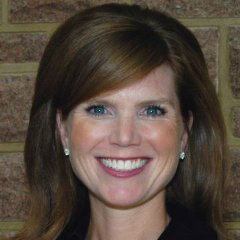
Rebecca L. Brown has worked for Washington University since 2001 and currently serves as Associate Dean for Career Services at the Law School. After graduating from law school, she began her law practice in commercial litigation at Bryan Cave, L.L.P., in St. Louis. Ms. Brown then transitioned into an in-house position at Deutsche Financial Services. She went on to serve as an Associate General Counsel at Washington University before she moved over to career advising in 2007. Ms. Brown has more than eighteen years of experience in higher education, student advising, and the practice of law. She is a thought leader known for developing creative solutions and innovation. Ms. Brown currently leverages her expertise in assisting others to identify their strengths. She helps individuals build upon these strengths to establish and accomplish professional goals.
Ms. Brown was born and raised in St. Louis, Missouri. She received her B.A. in Journalism and Political Science from Purdue University and her J.D. from Washington University Law School in St. Louis, Missouri. During law school, she externed at the U.S. Attorney's Office in St. Louis and was a summer associate at Shook, Hardy & Bacon in Kansas City.
When she isn't working, she spends time with family and is an avid long distance runner.
Successful Associate Dean of Career Services
Does Ms. Brown have a most memorable school experience she would like to discuss? "My most memorable was post grad. This fall my father received his 50 year medallion during a ceremony with the Chancellor. The next day my father and I walked together at graduation in full regalia and sat on the stage for the ceremony which included an address by Tony LaRussa. I don't think there are many father/daughter processionals like that and certainly never something I thought would happen when I took this job."
Why did she decide to become a career counselor? Ms. Brown explained:
"It was a natural progression into administration for me. The legal issues I was responsible for as associate general counsel all related to liabilities associated with student life. My favorite part of that job was working with the students. My position as associate dean of career services allows me to work with students every day. My background in higher education also helps me make valuable contributions as a member of the law school management team."What is the best part of her job? "Lots of them. Watching my students build confidence, find a job that they are excited to get up and go to every morning and making a major transition in life from student to professional."
What does Ms. Brown have a knack for? She stated:
"I am genuinely interested in learning everyone's story. I have a knack for remembering details about our students. This really helps in a position like this where there are so many qualified candidates. Remembering a detail about a student that I know will resonate with an employer or interviewer is extremely important in this role. People get jobs because they are talented and because they can relate to the person who is hiring."How has the market affected students from obtaining positions they want? Ms. Brown asserted:
"Students these days need to hustle. There will always be a percentage of the class who are able to secure jobs based on grades alone, but even for the very best students, interviewing skills, rapport and professionalism are incredibly important. In law school there are some factors that are out of a student's control - like the Property grade for instance. But there are plenty of factors that are in their control - like attitude, demeanor, gratitude, preparation and flexibility to name a few. Focusing on what you can control will get you further than focusing on what is done and in the past. I am also a big proponent of self-assessment. It is much easier to sell yourself in a job interview if you are in touch with your strengths that make you a good candidate for the position and have thought about why your life experience makes you a good fit. This process takes time, but the students who take the time I think are rewarded with careers that are a better match and more fulfilling long term."What does Ms. Brown do to prepare students who are entering the workforce in a downward economy? She acknowledged:
"I stress that networking cannot end after the first job is secured. The practice of law - particularly private practice - is a service industry where you constantly need to be growing and managing your network if you want to continue to grow professionally. As a new associate it may be your network within the firm as you look for good work, advocate for yourself and search for a mentor. As you mature in the practice, the networking expands into the community as you are expected to take on the responsibility of client development. While the sales component of networking may not exist to the same extent in public service, it is equally important to find a mentor and to build a professional network that supports your career goals."What advice would she give to students who are about to graduate and enter the workforce? Ms. Brown said:
"Practicing law is hard work. Particularly in the beginning. Many of my conversations with new graduates in their first positions have to do with managing the feeling of constantly being out of your comfort zone when every legal problem presented is new and seems like a monumental task to tackle. With experience will come a greater familiarity with the subject matter and the members of the legal team you are working with - so it does get easier. And find a stress reliever. For me it has always been running, but there are lots of other outlets. This is incredibly important if you are going to sustain the schedule and stress that is often a part of the practice long term."What advice would Ms. Brown give to a student who is struggling with their coursework? "Ask for help early. Go to office hours. Talk to the professor. Take advantage of the resources that are offered by your Student Services Office. Tell someone who can help you that you are struggling - you are not the first person to feel that way."
As a college career counselor, what area of counseling is she most passionate about?
"I really enjoy working with students who don't know exactly how they want to apply their talents. Learning about what makes a student tick, discovering that thing about their law school/life experience or course of study that really makes their eyes light up and then connecting them with a summer internship or post grad job that combines those things makes for a pretty good day at the office."
Where does Ms. Brown see herself in five years time? "Right here."
If she were not a college career counselor, what would she most probably be doing? "My dream job would be working for an adventure travel company as a guide."
What motivates Ms. Brown to be a college career counselor? "The challenge of helping my students make a connection or land a position that will have an impact on them personally and professionally."
Nonprofit Organizations, The Downside of Her Position and Ms. Brown's Goals
Is Ms. Brown involved with any nonprofit organizations? "I held officer positions in a number of St. Louis nonprofits. I also spend lots of time with my two kids."
Is there a downside to her position? "I choose to focus on the positive."
What are Ms. Brown's professional and personal goals? She noted:
"Professionally this position has combined three things I love: Washington University, working directly with students, and helping students to find careers in the law that were as satisfying as the ones that I found as a practicing attorney. I want to focus on growing my professional network and working to educate that network about the incredible talent pool that exists at Washington University Law School. Personally, I have a few crazy ultra marathon races on my bucket list that I would like to complete in the next year or so. Doing those things motivates me to bring my best to work every day and has taught me to take chances and push limits."





